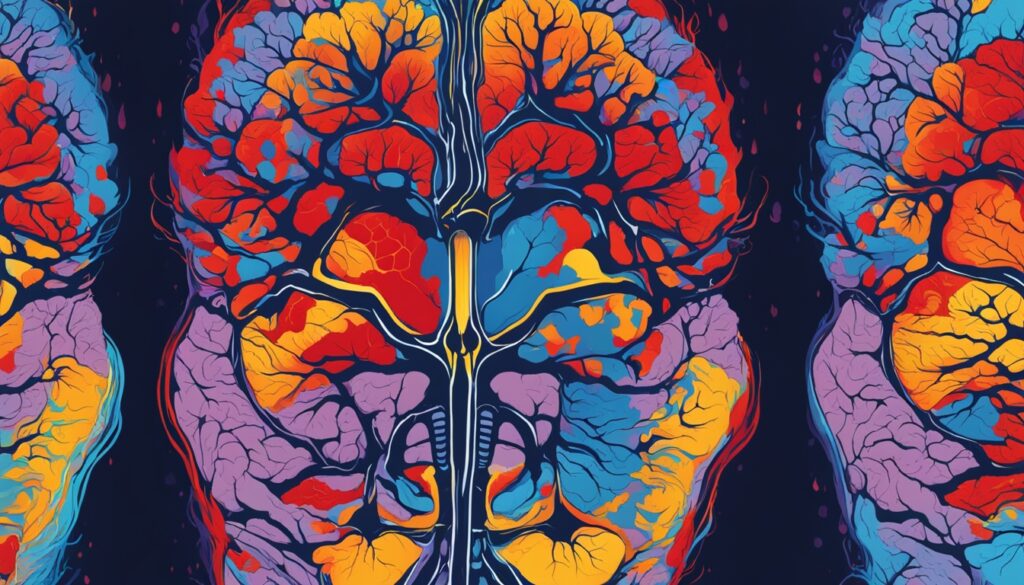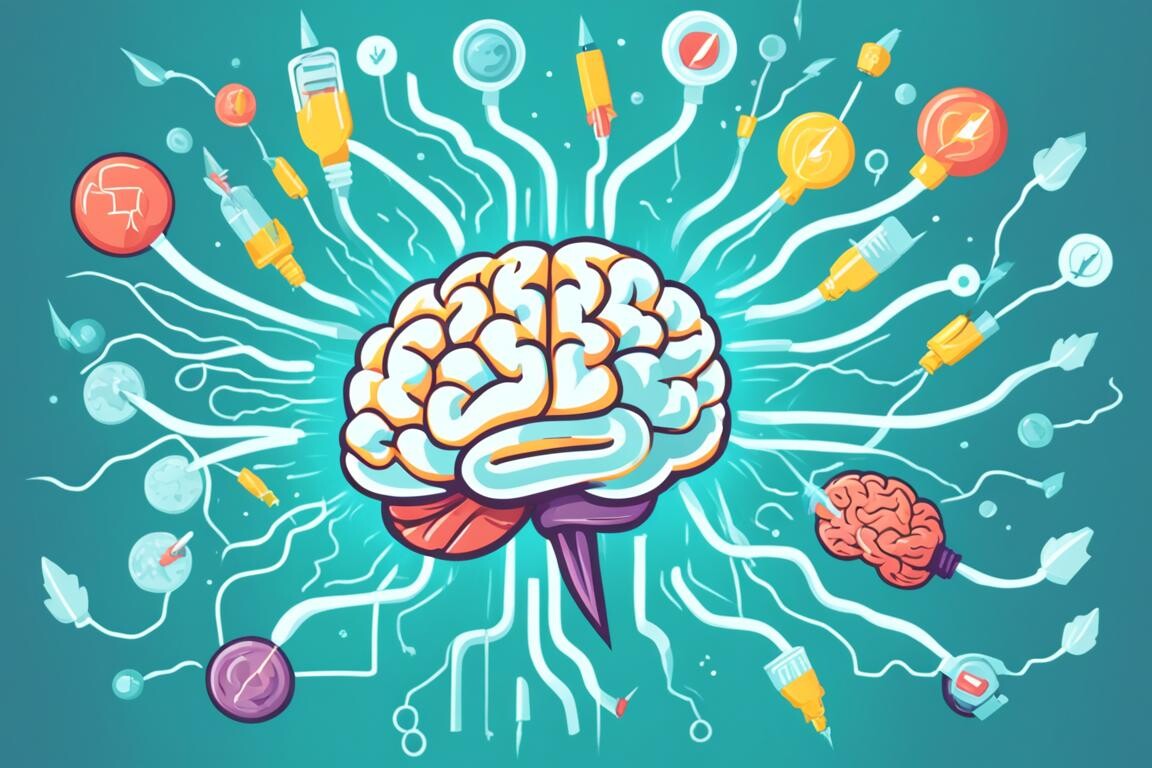Encephalopathy is a neurological disorder that affects brain function. It can greatly impact health and well-being. This guide offers a deep dive into potential causes. It covers common triggers like encephalopathy causes such as cirrhosis and alcohol abuse. It also mentions metabolic issues and exposure to toxins. By understanding the encephalopathy symptoms and diagnosis, you’ll be better prepared. You’ll learn about different forms of encephalopathy. This includes issues like neurotoxic and manganese-related problems. Our aim is to help you work with your healthcare team. Together, you can find the cause and explore encephalopathy treatment options.
This guide dives into the various causes of encephalopathy. It starts with common causes, like cirrhosis and alcohol use. It goes on to discuss rare but important factors like toxic substances. Knowing the causes is key to diagnosis and care. It includes blood tests, images, and brain checks. These tools help work with your healthcare team. Together, you can find the best treatment. With this knowledge, facing encephalopathy becomes easier. You can strive for the best health outcomes.
Table of Contents
ToggleIntroduction to Hepatic Encephalopathy
What is Hepatic Encephalopathy?
Hepatic encephalopathy happens when the brain is harmed by severe liver issues. Toxins not removed by the failing liver can build up. These toxins affect the brain, causing a variety of symptoms. At first, someone may just seem a bit confused. But, this can get much worse, even leading to coma in the worst cases.
Prevalence and Impact
About 30% of people with cirrhosis may face hepatic encephalopathy. This shows how common and serious the condition is. It can disrupt daily life and cause severe complications. This makes it a major worry for those with liver diseases, especially cirrhosis.
Encephalopathy causes
The main cause of hepatic encephalopathy is cirrhosis. Cirrhosis is a severe liver disease. It happens when the liver gets scared and can’t work right. This causes toxins to build up in the blood. These toxins can harm the brain. Drinking too much alcohol over a long time can also lead to alcoholic liver disease. This can cause cirrhosis and hepatic encephalopathy.
Cirrhosis
Hepatitis can lead to cirrhosis too. Hepatitis is liver inflammation, often due to viruses. Over time, this can increase the risk of hepatic encephalopathy. Also, taking drugs that are bad for the liver can lead to hepatic encephalopathy.
Alcohol Abuse
Sometimes, metabolic encephalopathy can be linked to hepatic encephalopathy. Metabolic encephalopathy is a problem with the brain’s biochemical functions. It may happen with liver diseases too. Wernicke encephalopathy is a rare problem. It’s caused by not getting enough thiamine, which is vitamin B1. This problem is mostly linked to alcoholism and malnutrition but can also affect liver health.
Hepatitis
Other less common causes of encephalopathy are low blood sugar, carbon monoxide poisoning, and fluid build-up in the brain without high pressure.
Drug Intoxication
Metabolic Encephalopathy
Problems like diabetes, liver diseases, kidney failure, or heart problems can cause metabolic encephalopathy.
Wernicke Encephalopathy
Wernicke encephalopathy happens because of not enough thiamin or vitamin B1. It’s often found in people who drink too much and are malnourished.
Other Rare Causes
Hypoglycemia, carbon monoxide poisoning, and normal pressure hydrocephalus are other uncommon reasons for encephalopathy.
Diagnostic Evaluation
Diagnosing hepatic encephalopathy means running many tests, looking at liver function and blood. We check blood ammonia levels to see if the liver isn’t working well. Liver function tests show how the liver is doing by checking blood for certain enzymes.
A complete blood count and electrolyte panel give hints about liver disease’s effects. Arterial blood gas analysis shows if there are issues with oxygen and carbon dioxide. Imaging tests like CT scans and MRIs look for liver changes. A test called EEG (Electroencephalogram) finds brain activity changes in hepatic encephalopathy.
Doing all these tests helps doctors make sure it’s hepatic encephalopathy and not something else.
Neurotoxic Encephalopathy
Neurotoxic encephalopathy is caused by harmful substances affecting the brain. It shares some symptoms with hepatic encephalopathy. Both can happen when the brain gathers too many toxins.
Symptoms and Diagnosis
This illness may change how you think, remember, see, and feel. It could cause dizziness, headaches, nausea, and shift your mood. Doctors figure out if you have it by checking your work, medicines you’ve taken, and doing brain tests.
Imaging Findings
By looking at the brain with MRI vision, doctors can spot some key signs. They might find issues like too much dopamine, parts of the brain that are smaller, nerve damage, and unusual brain activity.
Toxic Exposure Sources
Living near industrial sites or using certain drugs may raise your risk. Lead, in things like pills and perfumes, is a common culprit. Figuring out what’s harming you is vital to stop the damage.
Finding some types of this disease is not easy but very important. Misusing antipsychotic drugs or being around certain fumes can badly affect your nerves. Stories, like JetBlue’s Andrew Myers, show the real risk.
Testing includes brain scans and checking your brain waves. There’s no cure, so doctors focus on easing symptoms. Sometimes surgery or special diets are needed. But steering clear of the toxin is the best way to protect your brain.
Manganese Neurotoxicity
Manganese neurotoxicity, or manganism, is linked to too much exposure to manganese. It shows up like Parkinson’s disease with symptoms like shaking, stiff muscles, and trouble moving. Brain scans can reveal changes in the part of the brain that controls movement.
Parkinsonism and Manganese
Too much manganese can lead to issues similar to Parkinson’s, affecting how you move. This can include shaking, stiff muscles, and problems with balance. In a case, a man who welded steel developed these issues after seven years without protection.
Neurocognitive Effects
Being around manganese a lot can harm how your brain works. You can have trouble thinking, remembering things, and your mood might change. It’s very important to find this early and help the person to avoid lasting damage.

Carbon Monoxide Poisoning
Carbon monoxide poisoning can lead to brain problems with both quick and slow neurological effects. When someone is first exposed to it, they could get confused, feel dizzy, or even fall into a coma. Later on, they might have issues like Parkinsonism, which affects how they move.
Acute and Delayed Effects
Some people might not feel the worst effects until days or weeks after breathing in carbon monoxide (CO). These effects include memory loss and a more severe type of nerve damage. People who breathed in a lot of CO showed fewer cells that help protect the brain, making their nerve damage worse.
Neuroimaging Findings
Doctors can use CT and MRI scans to see brain damage linked to carbon monoxide. This damage often shows up on both sides of the brain, especially in a part called the globus pallidus. The scans might show the damaged area as a low signal on T1 and a high signal on T2/FLAIR.
Prevention and Treatment
It’s important to avoid breathing in carbon monoxide with good air flow, CO detectors, and quick poisoning treatment. Treating someone may mean giving them more oxygen, drugs, and therapy to help with brain issues. Things like broken heaters, cars without enough fresh air, and house fires are big causes of carbon monoxide problems.
Other Encephalopathy Causes
There are various causes of encephalopathy. Liver issues are the main ones. But, there are rare but important causes to know. For example, Methyl mercury poisoning can cause different symptoms like issues with vision and problems with moving. Methyl bromide toxicity, from breathing in chemicals, can hurt the brain and the part that controls movement. Poisoning from organotins, found in some work and farm chemicals, can also make movement difficult. Knowing about and treating these causes early can help stop severe brain issues.
Methyl Mercury Poisoning
Methyl mercury poisoning is a serious issue. It happens from eating fish with too much mercury. This mercury harms the brain. It causes problems with vision and movement.
Methyl Bromide Toxicity
Being exposed to Methyl bromide can also be harmful. This substance is used in certain jobs and on farms. It can cause problems in the brain and with movement. It’s vital to have good safety rules to prevent this harm.
Organophosphate Poisoning
Organophosphate poisoning comes from certain chemicals in work and on farms. It can make moving and daily life hard. People need to be very careful with these chemicals to avoid getting sick.
Conclusion
This guide has covered many reasons for encephalopathy, a brain issue that limits function. We looked at common causes like cirrhosis and drinking too much. Not as often, things like chemicals and body issues play a big part too. Learning these reasons is key to finding the right care.
Understanding encephalopathy is our aim here. We want you to feel ready to face this problem with your doctors. If you worry about what causes it, how it’s found, or what to do, this guide helps. Now you can take an active part in your health journey.
FAQ
What is encephalopathy?
Encephalopathy is a complex brain problem. It makes brain work bad. Many things can cause it, like liver issues, toxic things, and problems with how the body uses energy.
What are the common causes of encephalopathy?
Encephalopathy is often seen with liver damage, drinking too much, liver viruses, and drug overdose. It also happens with body energy problems and a specific brain injury called Wernicke encephalopathy.
How is hepatic encephalopathy diagnosed?
Doctors use many tests to find hepatic encephalopathy. They do blood tests to check ammonia and liver health. They also use brain scans like CT or MRI, and tests that look at brain waves (EEG).
What are the symptoms of neurotoxic encephalopathy?
Neurotoxic encephalopathy has symptoms like being confused, not thinking right, and changes in the brain’s way of working. Tests like special brain images show these changes.
How is manganese neurotoxicity (manganism) diagnosed?
Doctors find manganism by looking at symptoms like those in Parkinson’s disease. They also use brain imaging, especially MRI, to confirm the disease.
What are the effects of carbon monoxide poisoning on the brain?
Carbon monoxide can harm the brain right away or later. This may cause confusion, dizziness, coma, and Parkinson’s or other problems with moving. Special brain images can show certain damages from carbon monoxide.
What are some other rare causes of encephalopathy?
Rarer causes of encephalopathy are poisoning by methyl mercury, methyl bromide, and organotin. These can cause unique nerve issues and brain changes.
Source Links
- https://www.ncbi.nlm.nih.gov/pmc/articles/PMC7930293/
- https://www.ncbi.nlm.nih.gov/books/NBK430869/
- https://my.clevelandclinic.org/health/diseases/21220-hepatic-encephalopathy
- https://www.ncbi.nlm.nih.gov/pmc/articles/PMC6668878/
- https://www.webmd.com/brain/what-is-encephalopathy
- https://www.advocatehealth.com/health-services/brain-spine-institute/brain-care-center/conditions-treatments/encephalopathy
- https://www.mayoclinic.org/diseases-conditions/encephalitis/diagnosis-treatment/drc-20356142
- https://www.medicinenet.com/encephalopathy/article.htm
- https://www.ncbi.nlm.nih.gov/pmc/articles/PMC3521923/
- https://en.wikipedia.org/wiki/Toxic_encephalopathy
- https://www.ncbi.nlm.nih.gov/pmc/articles/PMC10166376/
- https://www.e-jmd.org/journal/view.php?doi=10.14802/jmd.20123
- https://pubmed.ncbi.nlm.nih.gov/30578768/
- https://www.ncbi.nlm.nih.gov/pmc/articles/PMC8011735/
- https://radiopaedia.org/articles/carbon-monoxide-poisoning-1?lang=us
- https://www.healthdirect.gov.au/encephalopathy
About The Author

Medically reviewed by Dr. Chandril Chugh, MD, DM (Neurology)
Board-Certified Neurologist
Dr. Chandril Chugh is a U.S.-trained, board-certified neurologist with expertise in diagnosing and managing neurological disorders, including migraines, epilepsy, Parkinson’s disease, and movement disorders. His clinical focus includes evidence-based neurological care and patient education.
All content is reviewed for medical accuracy and aligned with current neurological guidelines.





